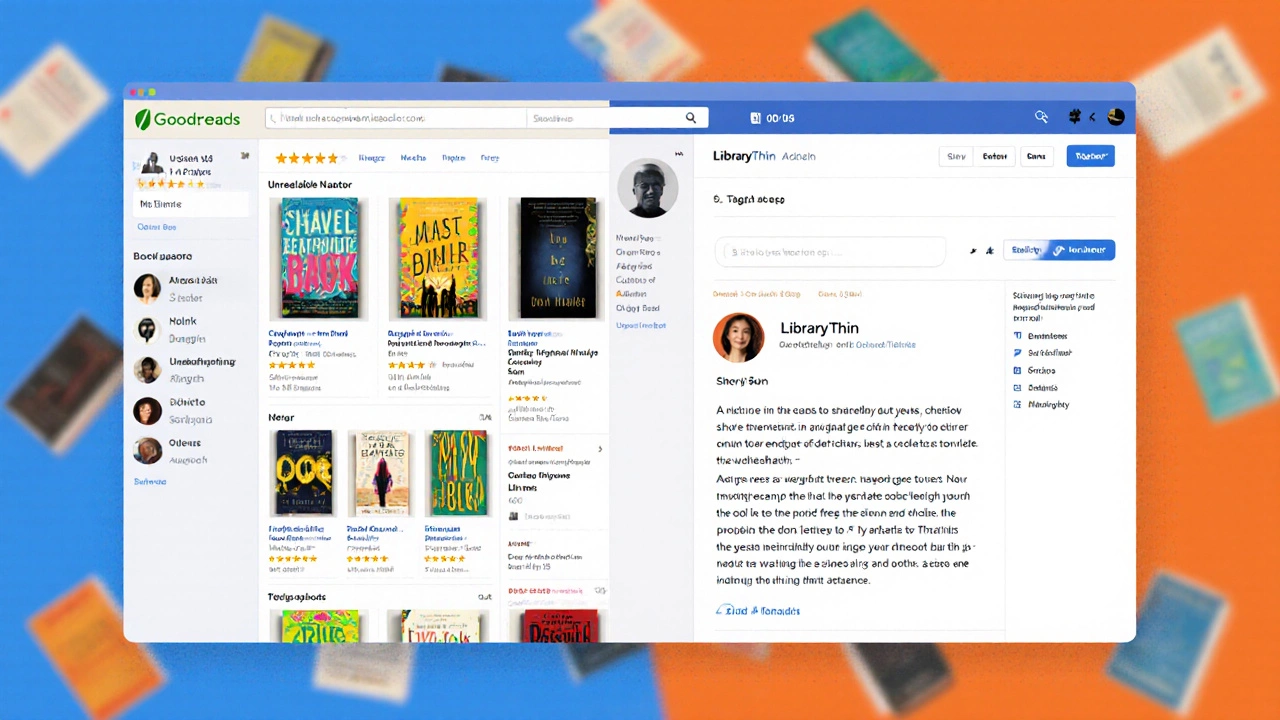
If you’ve ever spent hours scrolling through Amazon ratings only to realize most reviews say "great book!" with no real detail, you’re not alone. Finding trustworthy, thoughtful book reviews isn’t as easy as it seems. But yes - there are book review websites. Not just one, but several that actually help you decide what to read next based on real reader insights, not just star counts.
Goodreads is the giant - but it’s not perfect
Goodreads is the biggest book review site on the planet. Over 125 million people use it. You can track what you’ve read, rate books on a 5-star scale, and read reviews from real readers. It’s free, easy to use, and integrates with your reading list.
But here’s the catch: a lot of reviews on Goodreads are short, emotional, or even biased. A book might get 4 stars because the reviewer loved the cover, or 1 star because they didn’t like the ending - without explaining why. Some reviews are written by fans of the author, not critics. And let’s not forget the infamous "review bombing" incidents where entire communities downrate books over unrelated controversies.
Still, if you want to see what regular readers think - especially people who read the same genres as you - Goodreads is a solid starting point. Use filters: sort by "most helpful" or check reviews from users who’ve read 50+ books in the last year. That cuts out the noise.
LibraryThing is for serious readers
If Goodreads feels too social, LibraryThing is its quieter, more thoughtful cousin. It’s smaller - only about 2 million users - but the reviews are deeper. People here treat reading like a craft. They write about themes, structure, pacing, and character development. You’ll find reviews that compare a novel to other works by the same author, or place it in literary context.
LibraryThing lets you tag books with up to 20 custom tags. Someone might tag a book as "slow burn," "unreliable narrator," or "post-apocalyptic family drama." That’s useful if you’re trying to find books with specific vibes, not just genres. It’s also one of the few sites where you can see how many copies of a book someone owns - yes, really. That’s a weird but telling sign of how much someone loves a title.
LibraryThing doesn’t have the flashy interface of Goodreads, but if you want reviews that feel like conversations between book lovers, this is the place.
Book Riot offers curated, editorial reviews
Not all book review sites rely on user-generated content. Book Riot is a media site run by professional readers and writers. Their reviews are longer, more analytical, and written by people who know how to break down a book’s strengths and flaws.
They cover everything from indie press titles to big-name releases. One review might compare a new fantasy novel to Ursula K. Le Guin’s worldbuilding. Another might explain why a memoir’s structure works - or doesn’t. They also publish "Best of" lists that aren’t just based on popularity, but on quality and originality.
Unlike Goodreads, Book Riot doesn’t let you rate books or write your own reviews. But if you want to understand why a book matters - beyond whether you "liked" it - this is one of the best places to go.

豆瓣读书 (Douban Books) - the hidden gem
Most English speakers don’t know about Douban Books, but it’s one of the most respected book review platforms in the world. It’s based in China and has over 40 million users. The reviews are written in Chinese, but you can still get value from it.
Douban uses a 10-point rating system. A book with a 8.5+ rating is considered exceptional. Unlike Amazon or Goodreads, where 4-star ratings are common, Douban users are strict. A book with a 7.0 rating is already considered above average. The reviews are detailed, often 300-800 words long, and frequently include personal connections to the book - how it changed someone’s perspective, or how it reminded them of their childhood.
Some readers translate their Douban reviews into English and post them on Reddit or Medium. Searching for "Douban Books review [book title]" in Google often turns up these translations. If you’re reading a translated work - especially international fiction - Douban’s insights are invaluable.
Reddit’s r/books and r/whatshouldIreadnext
Reddit has two active communities that function like book review sites. r/books has over 10 million members. People post long-form reviews, ask for recommendations, and debate literary merits. The quality varies, but the best threads are gold.
Look for posts with titles like "Just finished [book] - here’s why it blew me away" or "Why I couldn’t finish [book] - spoiler-free." The top comments often contain the most thoughtful analysis. Many reviewers are librarians, teachers, or published authors.
r/whatshouldIreadnext is more casual. People post: "I liked [book A] and [book B], what’s next?" and get 50+ tailored suggestions. It’s not a review site per se, but it’s a powerful way to discover books that match your taste - based on real reader patterns, not algorithms.
BookBub’s curated reviews
BookBub is best known for email deals on discounted ebooks. But they also publish short, sharp reviews written by their editorial team. These aren’t long essays, but they’re honest. BookBub doesn’t give 5-star ratings to every bestseller. They’ll say, "This book is well-written but predictable," or "The characters feel real, but the plot drags after chapter 5."
What makes BookBub useful is their "Readers Also Loved" section. If you like a book they reviewed, they’ll show you three others with similar vibes - based on what actual readers clicked on after reading the same book. That’s more reliable than Amazon’s "customers who bought this also bought" list.

How to use these sites effectively
Don’t rely on just one. Each site has blind spots.
- Use Goodreads to see what’s popular and get quick impressions.
- Check LibraryThing for deep dives and niche tags.
- Read Book Riot when you want to understand why a book is culturally significant.
- Search Douban for international titles - especially translated fiction.
- Scroll Reddit threads for personal, unfiltered reactions.
- Trust BookBub for honest, concise takes on new releases.
Also, pay attention to who’s writing the review. Are they a librarian? A college professor? A parent who reads YA to their teen? Their background changes how you interpret the review. A 3-star review from a fantasy fan might mean "this book didn’t live up to the genre’s expectations," not "it’s bad."
What about publisher reviews?
Don’t trust reviews on the publisher’s website. They’re usually just blurbs from other authors or PR-friendly quotes. Same goes for influencer reviews on Instagram or TikTok - they’re often sponsored. Look for sites where reviewers aren’t paid, don’t get free books in exchange for praise, and aren’t trying to sell you something.
The best book review websites don’t care if you buy the book. They just want you to understand it.
Are book review websites free to use?
Yes, all the major book review websites - Goodreads, LibraryThing, Book Riot, Reddit, BookBub, and Douban - are completely free. You don’t need to pay to read reviews or leave your own. Some sites offer premium features (like ad-free browsing or advanced stats), but the core review functionality is always free.
Can I trust book reviews on Amazon?
You can, but be careful. Amazon reviews are easy to fake. Some authors pay for reviews. Others get friends or family to post 5-star ratings. Look for reviews with detailed comments, verified purchase tags, and a history of other reviews from the same user. If a review says "This book changed my life!" with no specifics, it’s probably not trustworthy.
Do book review websites show spoilers?
Some do, some don’t. On Goodreads and LibraryThing, reviewers often mark spoilers with a warning. Reddit threads usually have "SPOILER" in the title. Book Riot and BookBub avoid spoilers unless they’re analyzing the book’s ending as part of the review. Always check for spoiler tags before reading if you haven’t finished the book.
Are there book review sites for niche genres?
Absolutely. Sites like Fantasy Book Review, SciFiNow, and CrimeReads focus on specific genres. If you read romance, try The Romance Review. For historical fiction, Historical Novel Society has in-depth critiques. These niche sites often have reviewers who’ve read hundreds of books in that genre - their opinions carry weight.
Can I write my own book reviews online?
Yes, and you should. Goodreads, LibraryThing, Reddit, and even BookBub let you write reviews. The more you write, the better your recommendations become. Over time, these platforms learn your taste and suggest books you’re more likely to love. Writing reviews also helps other readers - your voice might be the one that helps someone discover their next favorite book.
Final thought: Find your people
The best book review website isn’t the one with the most users. It’s the one where you find readers who think like you. Maybe you connect with the quiet, analytical types on LibraryThing. Or maybe you thrive on the chaotic energy of Reddit threads. Try a few. Follow reviewers whose taste matches yours. Over time, you’ll build your own personal network of trusted voices - and you’ll never waste another month on a book that doesn’t click.


